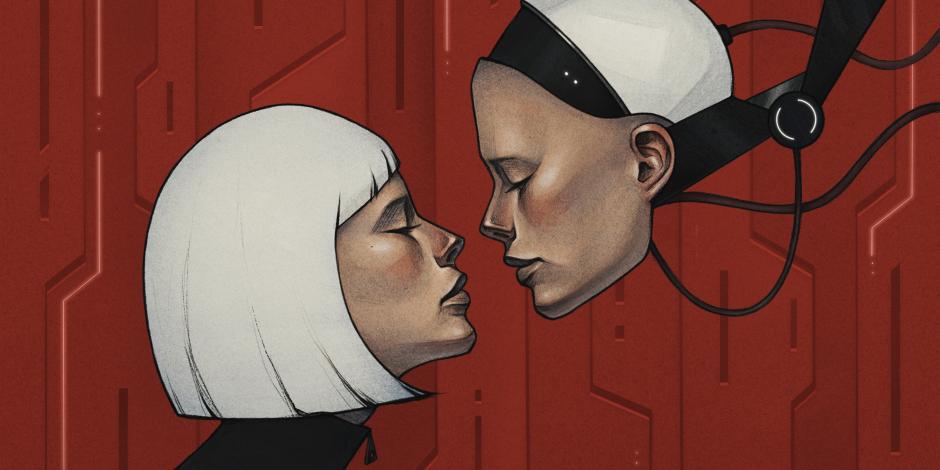Starten Sie den Audio-Text
Mit dem Audio-Player können Sie sich den Text anhören. Darunter finden Sie das Transkript.
Melita: Hi, listeners. This is Melita, Business Spotlight Audio’s audio editorRedakteur(in)editor. I’m here in the studio today with two of Business Spotlight’s editors, Rachel and Richard. How’s it going, guys?
Rachel: All good, thank you, Melita.
Richard: Can’t complain.
Melita: Oh, wow — feeling very energetic today here in the studio! Some of us have just recovered from colds, so we’re feeling a little bit lethargic, but we are here and we’re ready to talk about our chosen topicThematopic this month, which is AI anxiety. Anxiety is an emotion that people experience when they are worried or scaredverängstigtscared about something that could happen. AI, as you probably know, stands for “artificial intelligence”. And computers have been developing extremely quickly over the past few years, and are now able to do many tasks that humans would otherwise have done. Many people are becoming anxiousbesorgtanxious for various reasons. Rachel, is AI anxiety something that you’ve experienced?
Rachel: Yes, in some ways, I would say AI makes me feel anxious. I recently read an article in The Guardian by the author Jeanette Winterson who praised a short story created by Open AI. It was a fictional piece about griefLeid, Trauergrief that she described as “beautiful and moving”. And then she went on to say something like “humans will always want to read what other humans have to say”, but I’m not sure that’s the whole truth. I think for every text written by artificial intelligence that we read, we’re reading one less text written by humans.
Melita: That’s what worries me, too. And I know that a lot of conversations I have with friends and colleagues are about AI these days. I think it really boil down to sth.auf etw. hinauslaufenboils down to this tensionSpannungtension between our economic and emotional needs. But what worries me most is that, by cut cornersan allen Ecken und Enden sparencutting corners, we’ll be sacrificing quality.
Rachel: Yep, exactly. A friend of mine recently found an English translation of an Arthur Schnitzler story on the internet and, while reading it, she realized that it was an AI translation, and it wasn’t marked as such, but it had those horrible AI linguistic elements and no translator was list sb.jmdn. angebenlisted. And then, of course, that does impact sth.sich auf etw. auswirkenimpact people’s work. I read that more than a third of translators have already lost work due toaufgrunddue to generative AI, for example. And of course that goes for other creative jobs, too. Illustrators and graphic designers are being replaced by AI. And I saw that in Poland, radio hostModerator(in)hosts have been replaced by avatars, and so on.
Richard: But doesn’t any new technology take jobs away to a certain extent? The coal industry doesn’t want solar power. And look at means of communication. In the past, people only had the postal service and newspapers. And then, the radio came along, then television and the internet. New technology isn’t a reason to be afraid. It’s how you use it. And new jobs are created along with it. So different sectors will arise as a result of AI.
Melita: Ah, the voice of positivity. Thank you, Richard. That’s a reassuringberuhigendreassuring standpoint, particularly in a world where so many of us are fret about sth.sich über etw. aufregenfretting about AI taking our jobs. Would you say you have any concerns about AI, Richard, or are you feeling pretty calm about it?
Richard: I have questions, some concerns, I wouldn’t call it anxiety, just the normal issueProblemissues you have with any other new kind of technology. One thing does worry me though, and it’s this. Who is inputting into whatever AI you’re using? Is the input from diverse sources? Meta recently asked its users in Europe if they would agree to their public information being source sth.etw. beziehensourced for AI. And I’ll betwettenbet many people opt out (of) sth.etw. ausdrücklich widersprechenopted out for reasons of privacyPrivatsphäreprivacy, which is understandable. On the other hand, if women, people of colour or LGBTQ people are opting out, then who’s inputting?
Melita: Yeah, that’s a valid concern. If AI is inherentlygrundsätzlichinherently biasedvoreingenommenbiased because of the non-diverse group of people programming and inputting information into it, then that could have a pretty far-reaching impact. And another thing I find concerning is that sometimes AI generates information that is just plainschlichtwegjust plain wrong. As readers, we can’t just blindly trust information presented to us. We really need to fact-check it.
Rachel: Totally. I don’t know if you guys heard about it, but there was the case recently at the Chicago Sun-Times, a newspaper in the US, which published a summer reading list of books that don’t actually exist. The article had been written by AI. Journalists are lose out on sth.bei etw. das Nachsehen habenlosing out on work because AI is a cheaper alternative, but AI isn’t infallibleunfehlbarinfallible, and it’s still evolvesich (weiter) entwickelnevolving and can be full of misinformation.
Melita: Yeah, I read that and it made me laugh, but it also made me think this is the kind of sillinessDummheitsilliness that is going to happen more often in the future if we eliminate human input altogether. And let’s face itseien wir doch ehrlich, machen wir uns doch nichts vorlet’s face it, it’s not just the results that are going to be silly. over-reliancehier: blindes VertrauenOver-reliance on AI will also make us less intelligent.
Richard: I agree with you there. My biggest concern is that no one will think for themselves any more. That human source material will become indistinguishablenicht unterscheidbarindistinguishable from AI. No one’s going to do their homework any more. They’ll just ask AI. The capacity to think in both children and adults shouldn’t be diminished, but there’s a real risk there.
Melita: Yeah, I think what worries me is that if we prioritize efficiency above all else, then we’re going to lose out on other important factors. If we’ve streamline sth.etw. durchrationalisierenstreamlined our work processes and optimized our production, but we are no longer able to think for ourselves, is that really a win? I don’t think so.
Rachel: Yeah, I agree with you, Melita. I think it’s about making sure we are still able to do what we enjoy doing, and that AI doesn’t rob us of joy and creativity. There’s that meme on the internet that says, “I want AI to do my laundryWäschelaundry and dishes so that I can do art and writing”, not the other way around. And I can identify with that. Essentially, we want AI to help us with the tasks that we dislike or the tasks that humans aren’t yet capable of. That said, I do think AI can assist us in our day-to-day lives. As an assistive technology, it can help us to plan holidays or make those angry emails sound that little bit more professional, but I do worry about generative AI.
Melita: Absolutely, I think it can be helpful, but we do need to act with cautionVorsicht, Bedachtcaution. Well, guys, thank you so much for taking the time to share your thoughts with me about AI and, more importantly, how it makes you feel. And listeners, we’re curious to hear from you, too. Does AI make you feel anxious or do you think it’s just like any other technological development? Why not get in touch with us and share your thoughts? You can find us on LinkedIn @business-spotlight, Instagram @business.spotlight_official, Facebook @BusinessSpotlight — that’s with a capital “b” and “s” to start each word. Or, you can reach out to us via good old-fashioned email. We’d love to hear from you. Until next time, happy learning, guys.
Rachel: Bye.
Richard: Bye.
Neugierig auf mehr?
Dann nutzen Sie die Möglichkeit und stellen Sie sich Ihr optimales Abo ganz nach Ihren Wünschen zusammen.



